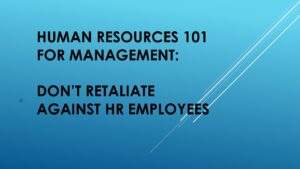 As an employment attorney representing workers, I often focus on the actions, or inactions, of management or human resources officials after an employee complains of discrimination or sexual harassment. Oftentimes a plaintiff’s case is enhanced by the company’s failure to promptly investigate a claim, and take remedial actions, like discipline, to prevent the alleged misconduct from occurring in the future. How much, however, does an employer need to do? The Fifth Circuit recently gave us a hint of what it considers “prompt remedial action” by an employer.
As an employment attorney representing workers, I often focus on the actions, or inactions, of management or human resources officials after an employee complains of discrimination or sexual harassment. Oftentimes a plaintiff’s case is enhanced by the company’s failure to promptly investigate a claim, and take remedial actions, like discipline, to prevent the alleged misconduct from occurring in the future. How much, however, does an employer need to do? The Fifth Circuit recently gave us a hint of what it considers “prompt remedial action” by an employer.
Nadiya Williams-Boldware worked as an Assistant District Attorney (ADA) in Denton County, Texas. She is African-American. One day at work, a white ADA was discussing a case he was preparing for trial. The case was against a black criminal defendant. The white ADA told Ms. Williams-Boldware that the alleged conduct of this criminal defendant “made him understand why people hung people from trees,” and also made him “want to go home and put on his white pointy hat.”
As expected, Ms. Williams-Boldware was shocked and offended. She complained to management, who seemingly took her complaint seriously, acted promptly, and took some action against the white ADA. The remedial action consisted of a verbal reprimand and mandatory attendance in diversity training. A few months later, Ms. Williams-Boldware overheard the same co-worker state he needed a “boombox” to play a tape at trial, and he then commented, “I better watch what I say or else I’ll have to take another one of those classes.” The Plaintiff reported these comments as well, but the employer took no additional disciplinary action against the white ADA. Subsequent to this second complaint, another white ADA came into Ms. Williams-Boldware’s office and called her a “troublemaker”. Ms. Williams-Boldware later sued Denton County, and a jury found in her favor on a claim of racial harassment.
On appeal Denton County argued, among other things, that it should not be held liable because it took prompt remedial action to end the harassment. The Fifth Circuit agreed, dismissing the race claim. The court pointed to the employer’s prompt response to the complaint, as well as the remedial action taken by Denton County to allegedly end the harassment.
This decision is problematic for workers for a few reasons. First, the court failed to give deference to the collective wisdom of the jury who heard the evidence and judged the credibility of the witnesses. The jury obviously did not believe that the racial harassment against Ms. Williams-Boldware stopped after her initial complaint.
Second, one must question the court’s conclusion that Denton County’s response was appropriate under the circumstances, and reasonably calculated to end the harassment. An assistant district attorney made a reference to the past lynching of African-Americans as being acceptable, and further inferred he was a member of a race hate group — the Ku Klux Klan. As a former ADA, I am appalled that a prosecutor’s office would continue to employ a prosecutor who made two racially charged statements while preparing to prosecute a black criminal defendant. Then of all people, he made these comments to a black co-worker. After given a slap on the wrist and a second chance, the ADA then made additional comments that could clearly be interpreted as race-based or taunting the same black co-worker he previously offended. The employer then chose not impose any additional discipline. Whether the use of the term “boombox” was racial, was a fact issue for the jury to decide in context with all the other evidence heard. The fact that he immediately followed this comment with a reference to diversity training certainly could lead one to conclude that he intended or was aware the term could be racially tinged in the presence of Ms. Williams-Boldware.
What’s the lesson taken from this case? In determining if an employer took prompt remedial action in response to a discrimination or sexual harassment complaint, it seems like the courts may be more satisfied that the employer took a remedial measure than an appropriate remedial measure.
“Prejudice is a burden that confuses the past, threatens the future and renders the present inaccessible.”
-Maya Angelou





